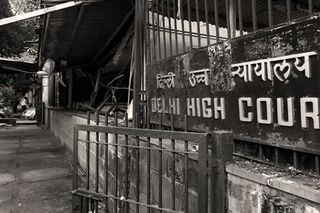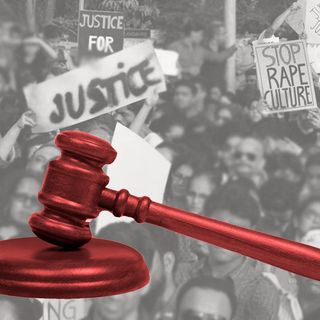
Delhi HC on Marital Rape: “A Rape Is a Rape.”
The court also said rape isn’t defined by the use of force.

“Marriage does not mean that [a woman] is ready and willing to submit herself for sexual act of her husband [sic],” the Delhi High Court said yesterday. The court also noted that the use of force is not a precondition to rape.
As The Indian Express reports, the High Court was responding to a Public Interest Litigation (PIL) made by an NGO called Men Welfare Trust. The NGO, which was led by a group of men (shocker!) claimed that intercourse, regardless of consent, between a man and his wife is “not unconstitutional,” nor is it rape. Earlier this year, a Kolkata NGO, Hridaya, had made a similar plea, arguing that a person consents to physical relations “for all time” when entering into marriage.
With this PIL, Men Welfare Trust were responding to petitions filed by other NGOs, RIT Foundation and the All India Democratic Women’s Association (AIWA), as well as by a marital rape survivor, which challenged the constitutionality of Section 375 of the Indian Penal Code. Section 375 defines rape, and includes an exception in the law that does not consider a man having sex with his wife, regardless of consent, as rape, unless she is younger than 15 years old.
Last year, the Supreme Court amended this exception, ruling that sex, even consensual sex, with a wife who is under 18 years old is rape. While this move was a substantial step forward, adult women remain without legal recourse if their husbands rape them (and child marriage remains legal). The petitions filed by RIT Foundation, AIWA, and the marital rape survivor urged the Delhi court to strike down the exception altogether.
In front of the High Court yesterday, Men Welfare Trust argued there are existing provisions for women seeking legal recourse for sexual violence committed by their husbands, such as domestic violence law, harassment to married woman, and unnatural sex (Section 377, which, incidentally, the Supreme Court is currently reconsidering, given that it also criminalizes intercourse for the LGBTQ community). Men Welfare Trust claimed that the use of force or threat constitutes rape, and in such situations, women are protected by the law.
The Delhi High Court’s retort was faultless. “A rape is a rape. Is it that if you are married, it is okay but if you are not, then it’s a rape? … Force is not a precondition for rape,” said the bench.
“Nowadays [the] definition of rape is completely different. [That] rape by husband has to [be] accompanied with force is a myth,” said Acting Chief Justice Gita Mittal. “It can be through blackmail or by putting a woman under financial pressure. Also in [the] name of children and other needs of the house, the woman is asked to submit herself.”
Unfortunately, while Justice Mittal and the rest of her bench appear to have eminently reasonable ideas on the criminalization of marital rape, the same cannot be said of our government. According to The Indian Express, the Centre has opposed the original petitions, saying that marital rape cannot be criminalized because it would “destabilize the institution of marriage” and “become an easy tool for harassing husbands.” It seems ludicrous that these could be considered valid arguments by a 21st century government, but here we are.
The arguments against criminalizing marital rape are bolstered by faulty logic. Men Welfare Trust argued there are no protections for men who experience sexual violence in a marriage, because laws in India are not gender-neutral, like they are in other countries. In isolation, this is a good point: Rape laws should be gender neutral. But by this logic, both men and women should be protected against marital rape — and this doesn’t seem to be either Men Welfare Trust or Hridaya’s ultimate goal. Rather, these men’s rights activists seek to reinforce the current male freedom to force sex upon their wives, and point to gender-specific laws not in any attempt to achieve gender equality, but as a way of nursing their own indignation over the potential loss of this freedom.
Furthermore, if we are considering worldwide laws, the argument that a law against marital rape will be used as a tool to “harass husbands” crumbles into little pieces. If that is indeed the case, would there not be an overflow of such cases in countries where marital rape is a criminal offense? (Spoiler alert: there is no such overflow.)
The next hearing on the matter will take place on August 8, after which hearings will take place on a day-to-day basis. One can only hope they will be heard by a bench as admirable as yesterday’s.
Urvija Banerji is the Features Editor at The Swaddle, and has previously written for Rolling Stone India and Atlas Obscura. When she's not writing, she can be found in her kitchen, painting, cooking, picking fights online, and consuming large amounts of coffee (often concurrently).
Related


Madras HC Reiterates: Father’s Name Not Compulsory on Birth Certificates
